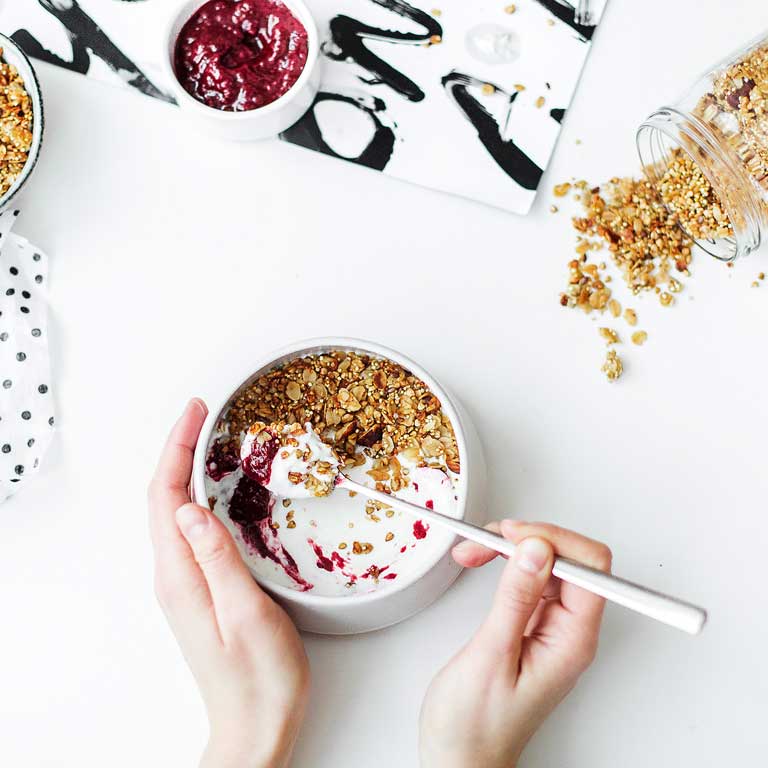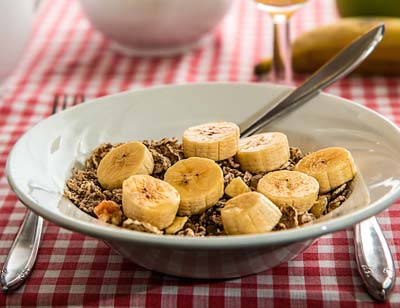
Prebiotics and probiotics: what's the difference?
You''ve probably heard your doctor or a close relative talk about the combination of prebiotics and probiotics at times when your bowels are not 100% healthy. But how do they differ from each other? When is it advisable to take them? How do they benefit our health?

To understand their use and the benefits they bring to our body, it is also important to understand their relationship with the maintenance of the intestinal flora, i.e. the set of bacteria and microorganisms that are housed in our intestine. Maintaining the state of our intestinal flora in optimal conditions allows a healthy condition of our organism to be maintained and also to remain stable.
This group of bacteria and microorganisms are also responsible for performing essential functions for our well-being, such as protecting us against possible diarrhea caused by antibiotic treatments, facilitating the absorption of nutrients, strengthening our immune system and contributing to the proper functioning of our digestive system, among other things.
However, in the face of possible situations that may alter their state (stress, continuous consumption of antibiotics, dietary imbalances, etc.), it is important that one always maintains healthy lifestyle habits, which include an adequate diet, an active lifestyle, not consuming alcohol and tobacco, etc.
Likewise, including probiotics and prebiotics in our daily lives will allow the good condition of the intestinal flora to be restored and for it to function properly.
What are probiotics and what are they for?
According to the FAO (Food and Agriculture Organization of the United Nations), probiotics are defined as "living microorganisms that, when consumed in appropriate amounts as part of a diet, confer a health benefit on the host organism".
Integrating these living microorganisms or "good" bacteria into our daily routine allows the intestinal ecosystem to be sufficiently strengthened in the face of possible health disorders and also improves its digestive physiology.
Natural probiotics
Natural probiotics are those living microorganisms that are naturally found in many of the foods we eat on a daily basis. Introducing natural probiotics into our daily eating habits provides direct benefits to our intestinal flora or microbiota, maintaining it in the face of any intestinal disorder, such as diarrhea, gas, the decay of the immune system or even stomach bloating, among other conditions.
However, there are several natural probiotic foods with a significant load of "good microorganisms" that contribute both to the good state of the defenses and the normal functioning of the digestive system and that, certainly, you have been including in your daily diet for a long time without being aware of the important benefits they have for the health of the intestinal flora. Some of these are:
- Yogurt. This is one of the most common natural probiotic foods consumed by the population. However, when choosing the most appropriate one, we must take into account that not all yogurts are good, and we must choose especially those that are natural and have not been pasteurized. It is preferable to consume those made from goat's and sheep's milk, as they are much richer in probiotics.
- Kefir. This is another of the most widely used natural probiotics when it comes to maintaining the health of the intestinal flora, very similar to yoghurt. It is a fermented drink thanks to a combination of bacteria and yeast and is easy to prepare at home. Among its benefits is supporting the body's defenses and facilitating the digestion of food.
- Olives and pickles. An appetizer that almost never fails in meals and gatherings with friends and family and certainly, you didn´t know about its benefits as a natural probiotic. Its intake contributes to the health benefit of the organism due to those live bacteria obtained in the fermentation process of these fruits and vegetables.
- Sauerkraut. This is obtained through the process of fermentation of white cabbage or coleslaw and provides benefits for intestinal movement and digestive health in general. It is also an important source of vitamin C.
- Kombucha. This is a drink of Chinese origin and is obtained by the fermentation of black tea leaves. It is still one of the most little-known natural probiotics, but it also provides important health benefits to the body.
- Dark chocolate. Besides being a real delight for our palate, it is also among the many natural probiotics beneficial to our body. It has more probiotics than any other type of dairy product.
Benefits of taking probiotics
Including in our daily routine the intake of probiotic foods, such as those mentioned above, or probiotic supplements provides countless benefits for the maintenance and good state of our health. Among their functions are:
- Increasing absorption of nutrients, such as iron, calcium, vitamin B, and others.
- Preserving intestinal integrity against possible intestinal diseases.
- Maintaining the proper functioning of the digestive system.
- Supporting the good functioning of the intestinal tract and preserving the maintenance of the intestinal barrier against the intake of antibiotics, which produce alterations in the balance of the intestinal flora.
- Participating in the proper maintenance and functioning of the immune system.
- Helping to digest lactose, which is also important for those who have developed lactose intolerance.
- Helping in the management of food intolerances and allergies.
- They are very useful for diseases when traveling, such as diarrhea caused by contaminated or unusual foods in our diet.
- Maintaining the integrity of the intestinal mucosa.
- Preventing the development and growth of bad bacteria in the intestine.
How and when to take probiotics?
There are two different ways to include probiotics in your lifestyle. On the one hand, and as we have seen above, by increasing the consumption of natural foods rich in probiotics or living microorganisms, such as yoghurt, kefir, olives and even dark chocolate, and by supporting our diet with probiotic supplements.
In the latter case, they can be presented in the form of sachets, liquids or in capsules and must be diluted in water or natural juices for consumption. However, given the wide variety of options, it is best to be advised by a health professional who knows how to recommend which one best suits your needs and circumstances.
As for the right time to take probiotics, it is important to always bear them in mind at those times when we consider that these microorganisms may be affected or threatened for adverse reasons, such as continuous intake of antibiotics, allergy, if you have any kind of infection, etc. However, it is usually advisable to take them on a daily basis.
On the other hand, we must also take into account the precise time when they should be taken, the most advisable being up to 30 minutes before a meal or during a meal.

What are prebiotics and what are their benefits?
Prebiotics are a type of indigestible dietary plant fibre that stimulate the growth of beneficial bacteria in the intestines. The fact that they are not digestible means that they pass directly through the digestive system to become food for all those "good" bacteria that lodge in our intestines. Food is the only way to access prebiotics, which are present in many fruits and vegetables. This is particularly true of those containing complex carbohydrates such as fibre.
Prebiotic foods
Among the foods rich in prebiotics, the most recommended are those rich in fiber, strong starch, inulin and oligosaccharides. Normally, prebiotics are found in foods that are of vegetable origin and also in breast milk:
- Onions
- Garlic
- Bananas or plantain
- Tomatoes
- Artichokes
- Honey
- Asparagus
- Dried vegetables
- Cereals
Difference between probiotics and prebiotics
What differentiates probiotics from prebiotics, and vice versa, is that while probiotics are living microorganisms that are consumed as part of a food or through nutritional supplementation, prebiotics are a type of dietary fibre that stimulates the growth of probiotics and other types of bacteria that are lodged in our bodies. Probiotics can be obtained either through a natural diet or through nutritional supplements, while prebiotics are obtained only from specific foods.





